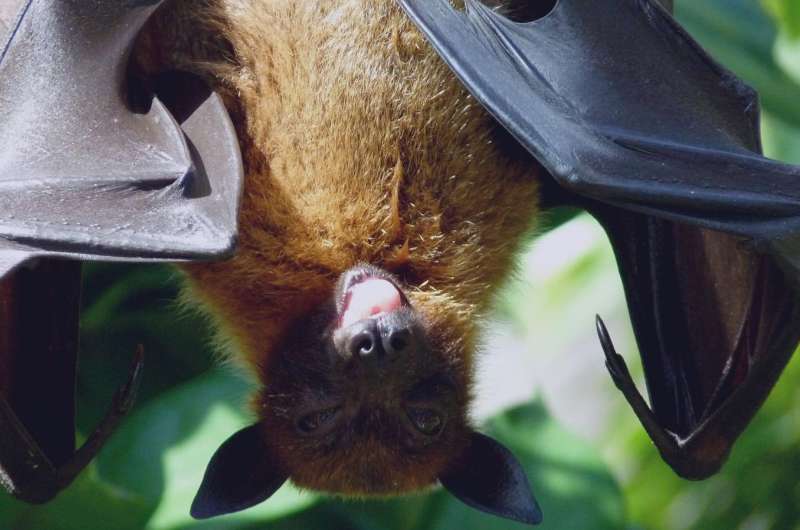Preventing pandemics by leaving bats undisturbed

As the COVID-19 pandemic slowly subsides, Cornell University College of Veterinary Medicine (CVM) experts and colleagues from the Wildlife Conservation Society have partnered on a new analysis in The Lancet Planetary Health journal focused on how such surges in deaths, illness, and suffering—as well as their economic costs—can be prevented in the future. One basic solution, the authors argue, may lie in a global taboo against harming or disturbing bats and their habitats.
“Focusing resources solely on efforts to address pandemics once they have already been unleashed, as most so-called prevention plans being developed by WHO and other global organizations currently seem to do, naively ignores the fact that humanity’s broken relationship with wild nature is how things got to this point in the first place,” said Steve Osofsky, D.V.M. ’89, Jay Hyman Professor of Wildlife Health & Health Policy and lead author of the paper.
Instead, the co-authors look farther upstream, to the interface between humans and wildlife where dangerous viruses can be transmitted when people eat the body parts of wild animals, capture and mix wild species together in markets for sale, and expand activities into what is left of Earth’s wilderness.
The COVID-19 pandemic can be traced back to a bat virus, just like the SARS outbreak of 2003. In fact, bats are known reservoirs for a wide range of viruses that can infect other species—including people—such as rabies, Marburg filoviruses, Hendra and Nipah paramyxoviruses, coronaviruses such as Middle East Respiratory Syndrome (MERS), and quite likely the Ebola family of viruses.
While many rural communities around the world rely on wild meat, bats are one taxonomic group that does not appear to be critical to most consumers’ nutritional or food security needs and could thus potentially be omitted from the human diet with minimal costs or inconvenience to most of the world’s population.
Given that most, but not all, of the identified bat-related activities of concern—such as bat hunting, consumption, and trade; bat guano harvesting, use, and trade; cave tourism; and incursions into key bat habitats with livestock, homesteads, mines, and crop agriculture at smallholder and industrial scales—occur in low-income and middle-income countries, the authors recognize the need to try to mitigate any socioeconomic or cultural burdens that voluntary changes in behavior would cause, and call for wealthier countries to provide logical forms of compensation.
“Such compensation would undoubtedly be a small price to pay to lessen the risk of future pandemics,” said Osofsky, who believes that preventing pandemics at the source is the most equitable way to benefit all of humanity.
The key, the authors say, is not to fear, chase away or cull bats—which may be counterproductive, because dispersing the animals only increases the odds of zoonotic spillover. On the contrary, allowing bats to survive and thrive by letting them exist undisturbed in their habitats can pay other dividends around the world. The ecosystem services bats provide—from control of mosquitos and other harmful insects to crop pollination—are worth many billions of dollars annually.
“Getting Homo sapiens to work collaboratively at a global scale underpins most of the existential challenges we face, from climate change to environmental pollution to biodiversity loss and ecosystem collapse to averting nuclear war—this at a time when earnest collaboration even at local scales often seems elusive,” Osofsky noted.
“However, if we can actually stop hunting, eating, and trading bats, stay out of their caves, keep livestock away from areas where bats are concentrated, and if we can stop deforesting, degrading—or even start restoring—their natural habitats, we can indisputably lower the chances of another pandemic.”
The paper is published in The Lancet Planetary Health journal.
More information:
Steven A Osofsky et al, An immediate way to lower pandemic risk: (not) seizing the low-hanging fruit (bat), The Lancet Planetary Health (2023). DOI: 10.1016/S2542-5196(23)00077-3
Citation:
Preventing pandemics by leaving bats undisturbed (2023, June 6)
retrieved 6 June 2023
from https://phys.org/news/2023-06-pandemics-undisturbed.html
This document is subject to copyright. Apart from any fair dealing for the purpose of private study or research, no
part may be reproduced without the written permission. The content is provided for information purposes only.
For all the latest Science News Click Here
For the latest news and updates, follow us on Google News.

